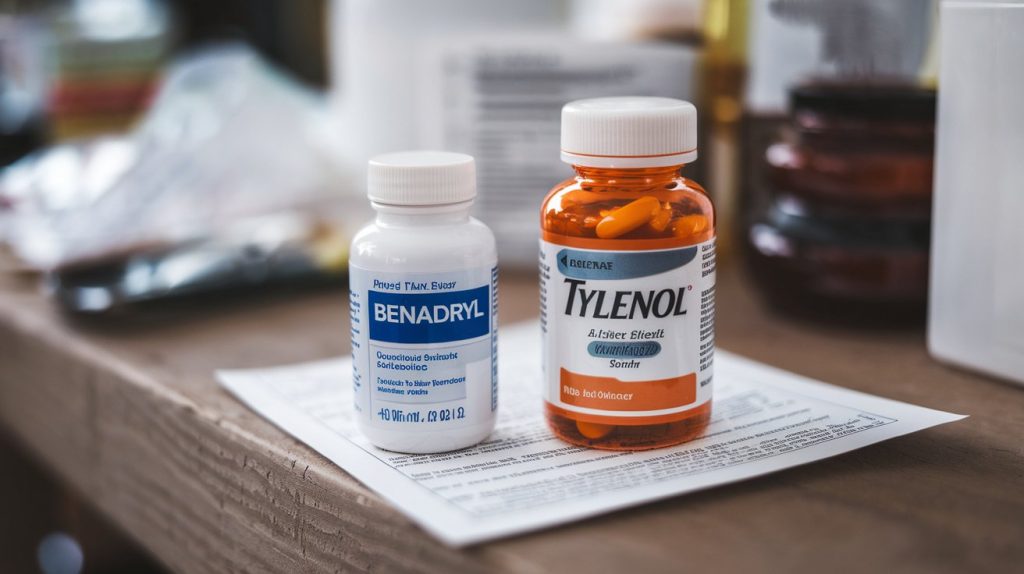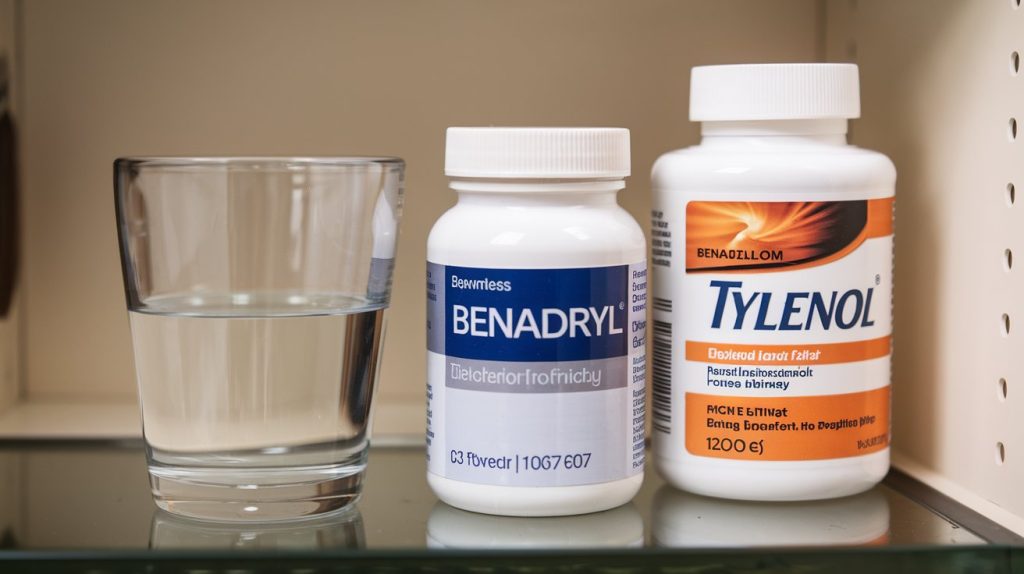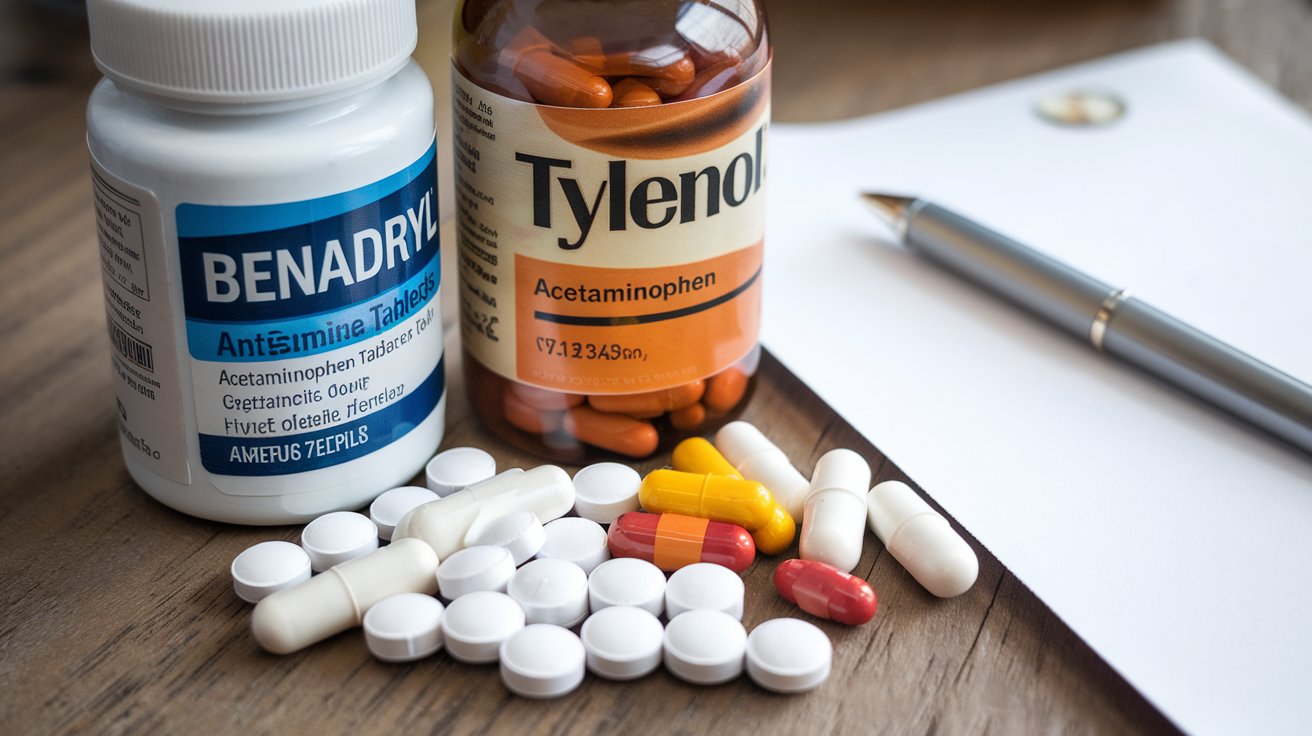Table of Contents
When you’re feeling unwell, whether from allergies, a cold, or general aches and pains, you might wonder, “Can you take Benadryl and Tylenol together?” Although the two drugs are frequently used to treat distinct symptoms, is it safe to take them together? In Can You Take Benadryl and Tylenol Together? article, we’ll explore the safety of using Benadryl and Tylenol together, how they work, and what you need to know to enjoy safe relief from your symptoms.
Understanding Benadryl and Tylenol: How Do They Work?

Can You Take Benadryl and Tylenol Together? Before we discuss Can You Take Benadryl and Tylenol Together, it’s essential to understand what each medication does and how it works in your body.
What Is Benadryl?
As an antihistamine, Benadryl is also known by its generic name, diphenhydramine. It’s often used to relieve symptoms of allergies, such as sneezing, runny nose, itching, and hives. Benadryl blocks histamine, a substance your body produces during an allergic reaction. It also has soothing properties, which means it can make you feel drowsy, making it helpful in helping with sleep issues or anxiety.
What Is Tylenol?
Acetaminophen, also known as Tylenol, lowers fever and relieves pain. It’s commonly used to treat headaches, muscle aches, arthritis, backaches, toothaches, colds, and fevers. Tylenol works by blocking the production of prostaglandins, chemicals in the body that cause pain and inflammation.
Can You Take Benadryl and Tylenol Together? The Safety of Combining Them
Can You Take Benadryl and Tylenol Together? Now that you know how Benadryl and Tylenol work, Can you take them together safely? The answer is generally yes but with some consideration.
No Direct Interactions
There are no known direct interactions between Benadryl and Tylenol, which means they can be taken together without the risk of the medications interfering with each other’s effectiveness. This makes them a safe combination for most people when used as directed.
Complementary Effects
Because Benadryl and Tylenol work differently, they can complement each other. For example, if you have a cold with a headache, you might take Tylenol for the pain and fever while using Benadryl to relieve nasal congestion and help you sleep.
When Should You Be Cautious? Important Considerations
Can You Take Benadryl and Tylenol Together? While taking Benadryl and Tylenol together is generally safe, there are a few essential considerations to remember to ensure you use them safely.
Dosage Matters
It’s crucial to follow the recommended dosage for both Benadryl and Tylenol. Taking too much of either medication can lead to serious health risks. Exceeding the maximum daily dose of Tylenol can cause liver damage while taking too much Benadryl can lead to excessive drowsiness, confusion, and even more severe side effects.
Underlying Health Conditions
You should consult your doctor before taking Benadryl and Tylenol together if you have certain health conditions. For example, people with liver disease should be cautious with Tylenol, and those with conditions like glaucoma, asthma, or prostate problems should be careful with Benadryl.
Potential for Increased Sedation
Because Benadryl has soothing properties, taking it with Tylenol, especially if you’re already unwell or tired, can increase drowsiness. This can be helpful if you’re trying to rest, but avoiding activities requiring alertness, such as driving or operating machinery, is essential after taking these medications.
How to Safely Take Benadryl and Tylenol Together
Can You Take Benadryl and Tylenol Together? Follow these guidelines to ensure you’re safely taking Benadryl and Tylenol together.
Check the Label
Always read the labels of both medications before taking them together. Ensure that the products don’t contain other active ingredients that might interact or lead to an overdose. Some combination products, like cold or flu medications, might already contain acetaminophen (Tylenol) or antihistamines (like Benadryl), so double-checking is essential.
Stick to the Recommended Dosage
For Tylenol, the typical dosage for adults is 500 to 1,000 mg every 4 to 6 hours, not exceeding 4,000 mg in 24 hours. For Benadryl, the standard adult dose is 25 to 50 mg every 4 to 6 hours, not exceeding 300 mg in 24 hours. Always stick to these limits unless directed otherwise by a healthcare professional.
Monitor for Side Effects
While taking Benadryl and Tylenol together is generally safe, monitoring your body for any unusual symptoms is essential. Benadryl’s side effects can include dry mouth, dizziness, and drowsiness. Tylenol is usually well-tolerated but can cause liver damage if taken in excessive amounts. As soon as you notice any worrisome signs, get medical help.
Also read: How Long After Botox Can You Lay Down: Your Safe Guide
Special Considerations for Children and the Elderly
Children and the elderly are more sensitive to medications, so extra caution is needed when giving them Benadryl and Tylenol.
Safe Use in Children
For children, dosing of both Benadryl and Tylenol should be based on weight and age. Always use the pediatric formulations and dosing tools provided with the medications. Never give a child a medication meant for adults, and consult a pediatrician before giving your child Benadryl and Tylenol together.
Safe Use in the Elderly
Elderly individuals may be more susceptible to Benadryl’s sedative effects, which can increase the risk of falls and confusion. They may also have a higher risk of liver issues from Tylenol. It’s advisable for older adults to consult their doctor before combining these medications and to use the lowest effective dose.
Alternatives to Taking Benadryl and Tylenol Together

Can You Take Benadryl and Tylenol Together? If you’re concerned about taking Benadryl and Tylenol together or looking for alternatives, there are other options.
Natural Remedies for Pain and Allergies
For mild symptoms, natural remedies may provide relief. For example, honey and lemon can soothe a sore throat, while a saline nasal spray can help with congestion. For pain, try using a cold compress or warm bath to relax muscles.
Over-the-Counter Alternatives
Other over-the-counter medications may also help. For pain, ibuprofen or aspirin are alternatives to Tylenol. For allergies, non-drowsy antihistamines like loratadine (Claritin) or cetirizine (Zyrtec) can be used instead of Benadryl.
So, can you take Benadryl and Tylenol together? The answer is yes, you can, and it’s generally safe when done correctly. You can safely enjoy their relief by understanding how these medications work, sticking to recommended dosages, and considering your health situation. Can You Take Benadryl and Tylenol Together? Whether you’re dealing with a cold, allergies, or pain, combining Benadryl and Tylenol can help you feel better and get the rest you need. Always consult your healthcare provider if you have any concerns, and enjoy the peace of mind that comes with safe and effective treatment.




